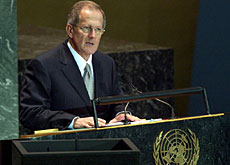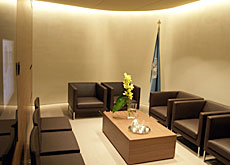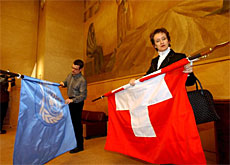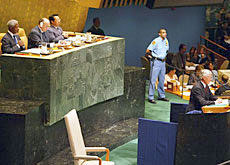Deiss calls for reform of UN Security Council

The Swiss president, Joseph Deiss, has called for a bold reform of the United Nations and questioned the composition of the Security Council.
Deiss said the Iraq crisis had shown that the structures currently in place at the world body were “no longer appropriate” and it was time to act.
He was speaking at the General Assembly in New York following an address by United States President George W. Bush. Deiss told journalists he was disappointed by Bush’s speech, which had contained little new.
But he welcomed Bush’s promise that the US would take its responsibilities within the UN seriously.
“The composition of the Security Council must better reflect the changes that have taken place in the international context since it was first established, and more say must be given to countries in the process of development,” Deiss told the General Assembly.
He added that the financial and material contributions of specific member states had to be taken more closely into account.
But Switzerland was opposed to the creation of new seats with the right of veto, because the right of veto in its present form was “undemocratic” and hampered the capacity of the Security Council to act.
“To gain greater legitimacy, it is also necessary that those countries which are not members of the Security Council have more opportunities to participate in the decision-making process.”
“Strengthen consultation”
“In particular, it is important to strengthen the mechanisms of consultation with countries directly involved in particular situations of tension,” he said.
Deiss noted that dissent over Iraq had once again risen within the Security Council and indirectly criticised the United States-led invasion of the country.
“In hindsight, experience shows that actions taken without a mandate which has been clearly defined in a Security Council resolution are doomed to failure,” he said.
“Such actions result in endless differences of opinion which only reduce the efficiency of the international community’s decision-making efforts and, ultimately, jeopardise international security.”
Deiss argued that UN members should focus their efforts on strengthening joint action, including the prevention of conflicts.
Fighting poverty
This meant fighting poverty and more rapid reaction to nascent crises from the multilateral institutions.
But a more rapid response did not necessarily mean military intervention.
“Switzerland has always held the view that force must remain the instrument of last resort.”
“Besides situations of self-defence, force may only be used with the approval of the Security Council and when other methods of persuasion or pressure have been completely exhausted,” he said.
Deiss said the process of reform might be “arduous and unrewarding” but was indispensable for raising the efficiency of the UN and promoting peace.
“To remain credible in its role as keeper of the peace the UN and its member states must, above all, be unshakeable guarantors of international law and, in particular, international humanitarian law.
“Switzerland will not cease to say and say again that respect for the law is the only feasible way,” he said.
More peace promotion
Deiss, who is Switzerland’s economics minister, argued that peace promotion efforts had to be fleshed out in two areas. One was in conflicts associated with religion and the other was environmental preservation.
“Killing is unacceptable. It is even more unacceptable if it is carried out for religious reasons. Religion is becoming more and more frequently the only frame of reference for analysing political and social problems,” he said.
This extreme simplification of reality risked heightening tensions. “The international community must find a solution and the UN is the ideal forum for finding it,” he added.
On environmental preservation, Deiss commented that the increasing scarcity of resources was sowing the seeds of conflict over appropriation and distribution.
The UN had not done enough to protect the environment for future generations, Deiss argued.
“Devoting more time to finding agreement on the Kyoto Protocol than the founding fathers took to draft the Charter of the United Nations seems to be beneath our dignity,” he said.
On Monday, Deiss officially inaugurated Switzerland’s accession gift to the UN – a refurbished set of offices that serve as the backstage of the General Assembly.
swissinfo
Switzerland became a full member of the UN on September 10, 2002.
On Monday, Switzerland presented its accession gift to the UN – refurbished rooms serving as a backstage to the General Assembly.
Swiss politicians have pleaded before the UN for respect of humanitarian law and the security of people.
This year’s Swiss president, Joseph Deiss, has called for reforms within the United Nations because current structures are “no longer appropriate”.
In particular, the Security Council must reflect the changes that have taken place around the world since it was first established.
But he said Switzerland was against the creation of new seats with the right of veto.
Deiss argued that more say must be given to the countries in the process of development.

In compliance with the JTI standards
More: SWI swissinfo.ch certified by the Journalism Trust Initiative













You can find an overview of ongoing debates with our journalists here . Please join us!
If you want to start a conversation about a topic raised in this article or want to report factual errors, email us at english@swissinfo.ch.